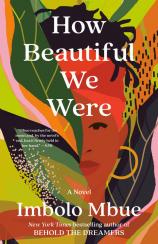How Beautiful We Were
Review
How Beautiful We Were
Early in Imbolo Mbue's devastating second novel, HOW BEAUTIFUL WE WERE, the residents of Kosawa, a village in an unnamed African country, attend a meeting with a trio of representatives from Pexton, the massive oil company that has been drilling on their ancestral land. It is 1980, and since Pexton’s arrival some years earlier, poison has seeped into the air they breathe, the water they drink, and the land in which they grow their food. The village and its children are dying. People are desperate for relief.
What they get in response to their pleas for help are empty promises and lies --- lies that Pexton is working to resolve their complaints and clean up the mess it has made, and lies that the corrupt government in the distant capital of Bézam cares about their suffering. But the people of Kosawa are tired of being lied to by smiling lackeys. So when Konga, the village madman, strikes back at the Pexton men, the villagers go along with his rebellion, reasoning that “perhaps madness is what we all need.” It's a stunning act of defiance that will echo across the next four decades as the people of Kosawa fight for their homeland.
"In this novel, which is by turns both beautiful and brutal, Mbue gives voice to those living under the long shadow of colonialism who are fighting for freedom, self-determination and dignity."
One of the children present during Kosawa’s initial rebellion is a girl named Thula, a serious-minded child who, when we first meet her, wonders “how many bullets it would take to kill me.” But despite this precocious preoccupation with death, she develops a steadfast faith that she eventually will be able to get justice for the family members she has lost, the village she is from, and her country’s people. “I know nothing about how a girl makes men pay for their crimes, but I have the rest of my life to figure it out,” she says. This quest becomes the fulcrum around which the book revolves.
But HOW BEAUTIFUL WE WERE is not simply a story of Thula’s journey from schoolgirl to revolutionary (indeed, some readers may find themselves frustrated as she recedes from the narrative, visible only through the observations of others or her letters home to friends). Nor is it just a familiar David-and-Goliath tale of the disadvantaged standing up to a big bad corporation. It is a more complex, multi-generational saga told from multiple perspectives: Thula; her mother, Sahel; her grandmother, Yaya; her uncle, Bongo; and her brother, Juba. These chapters alternate with the collective recollections of the town’s children. The result is a richly layered portrait of the slow, painful disappearance of "a singular place." In Mbue’s novel, the village of Kosawa is a character as vivid as the people who live there. She brings to life the rhythms and traditions of this community, its joys and its sorrows, and we feel their loss all the more keenly as it becomes clear that the villagers are fighting a losing battle to preserve their homes.
Kosawa and its people are caught between a corrupt dictator and a ruthless, and an indifferent, faceless American oil company. (The company’s representatives appear in town from time to time, but they merely spout the company line; it’s clear the real power lies elsewhere.) The villagers hope to rid themselves of the scourge of drilling on their land and force Pexton to clean up the land and water it has sullied, though they are not in agreement as to the best way to accomplish this goal. Some believe that a combination of public shaming and legal pressure will compel the company to do the right thing, particularly after it is implicated in a shattering act of violence. Others embrace a philosophy of armed rebellion. But as the struggle for justice stretches on for years, then decades, many simply give up. They move away to different, distant villages, an attrition that sucks more life from the town.
However, as Mbue, a native of Cameroon, shows, what ails Kosawa --- and the country as a whole --- involves more than a shady deal between Pexton and His Excellency, the man who has ruled since shortly after independence. There is the painful, intertwined legacy of the slave trade, the Christian missionaries who worked to convert the people, and the European powers that conscripted men to work on rubber plantations. Colonialism may have officially ended decades earlier, but foreigners still arrive to extract what they can from the land and leave the ruins behind. Meanwhile, the country’s Idi Amin-esque despot operates with impunity, as “he harvests whatever pleases him and destroys whoever displeases him.” One character wonders which was worse, “the European masters, or His Excellency. The madmen who created this farce of a nation, or the servant who took over the task of making sure it never fell apart.”
In this novel, which is by turns both beautiful and brutal, Mbue gives voice to those living under the long shadow of colonialism who are fighting for freedom, self-determination and dignity. “We hoped, we believed, that we would die where we were born,” the children say toward the book’s end, when even that small dream has been taken from them. What remains is a searing portrait of the human and environmental cost of rapacious capitalism, and the image of a people determined not to be forgotten.
Reviewed by Megan Elliott on March 12, 2021
How Beautiful We Were
- Publication Date: February 1, 2022
- Genres: Fiction
- Paperback: 384 pages
- Publisher: Random House Trade Paperbacks
- ISBN-10: 0593132440
- ISBN-13: 9780593132449




